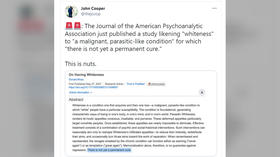THIRD member of FDA advisory body resigns, calls Alzheimer's drug approval ‘worst in recent US history’
Three scientists from a FDA advisory committee have resigned after the US food and drug regulator rammed through the approval of a controversial drug to treat Alzheimer’s disease in the face of near-unanimous opposition.
Ten out of 11 members of the Peripheral and Central Nervous System Advisory Committee voted against approving the drug aducanumab, with one voting “uncertain,” during the hearings in November 2020. On Monday, the FDA granted it accelerated approval anyway.
“This week, the aducanumab decision by FDA administrators was probably the worst drug approval decision in recent US history,” wrote Aaron Kesselheim of Harvard and the Brigham and Women’s Hospital in Boston, Massachusetts – who became the third member of the committee to resign in protest this week.
Harvard's Aaron Kesselheim resigns from FDA advisory committee after its recommendation on Biogen's Alzheimer's Aduhelm drug was ignored pic.twitter.com/a1eYasMsSi
— Joseph Walker (@joewalkerWSJ) June 10, 2021
The agency switched to accelerated approval “at the last minute,” based on the “debatable premise” that the drug’s effect was likely to help patients, but “this pivotal question was not discussed at the Advisory Committee meeting, and its premise was specifically excluded from discussion,” Kesselheim wrote. Furthermore, some of the questions asked of the committee were “worded in a way that seemed slanted to yield responses that would favor the drug's approval.”
Kesselheim, who has served on the committee since 2015, said it was “clear to me that FDA is not presently capable of adequately integrating the Committee's scientific recommendations into its approval decisions.”
Two neurologists serving on the committee – David Knopman of the Mayo Clinic in Minnesota and Joel Perlmutter of Washington University in St. Louis, Missouri – resigned on Wednesday.
Developed by the Cambridge, Massachusetts-based Biogen and Japan’s Eisai, aducanumab – also known by the trade name Aduhelm – was touted as the first treatment that directly targets the cause of Alzheimer’s disease, instead of merely helping to ease its symptoms. Biogen’s stock surged at the news that the intravenous treatment – the cost of which is estimated at $56,000 a year – had been greenlit by regulators.
Aduhelm is a monoclonal antibody designed to remove a substance called amyloid from the brain of Alzheimer’s patients. Doctors are not in agreement whether this is the cause or the symptom of the disease that presently afflicts an estimated six million Americans. Clinical trials were halted in 2019 after the drug was not shown to be effective, but Biogen “re-analyzed” the data and told the FDA that some patients who received higher doses had shown a slower rate of decline than others.
The FDA then argued that the drug “is reasonably likely to predict a clinical benefit to patients,” even if it did not show clear clinical benefits in slowing down the progression of Alzheimer’s.
Aduhelm was the final straw for Kesselheim, whose letter also cited an earlier incident with the drug called eteplirsen, approved in 2016 for treatment of Duchenne muscular dystrophy against the advisory recommendations.
“For both eteplirsen and aducanumab, the decisions by FDA administrators to ignore the Advisory Committee's clear recommendations led to their approval of two highly problematic drugs that offered little evidence that they would meaningfully benefit patients suffering from these devastating conditions,” he wrote, adding that the dual debacles “demonstrate that the agency needs to reassess its decision-making processes.”
Advisory resignations were not the only criticism the FDA has had to face when it comes to Aduhelm. Columbia University Professor Jennifer Manly, who focuses on “social justice in dementia research,” objected to the “shamefully poor representation of black, Latinx, Asian American, and indigenous people in the trials.”
With a $56K list pricetag from Biogen that underestimates actual cost of treatment to ppl living with dementia & taxpayers, Biogen has been working with other companies in partnership to profit from this. As a scientist focused on social justice in dementia research, I'm outraged
— Dr. Jennifer Manly (@ManlyEpic) June 10, 2021
Think your friends would be interested? Share this story!
















